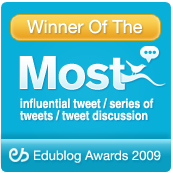An advantage that I have as one who is fortunate enough to attend many education conferences, or special education events is the contact I have with many of the thought leaders in education. Of course most of those folks do not think of themselves as thought leaders, but just educators. The fact is that we are often defined by the perception of others. This holds true for institutions as well.
Does making change count?
April 15, 2013 by Tom Whitby @tomwhitby
Posted in Accountability, Administrator, Assessment, conference, Connected Educator, Education, PD, PLN, Professionalism, Reform, Teacher, Technology, Thought leadership, Thought Provoking | 10 Comments
10 Responses
Leave a reply to David Fleming Cancel reply
Tom Whitby
Translate This Post Traducir este Blog
Search previous posts by Keyword
- Follow My Island View on WordPress.com
-
Join 6,340 other subscribers
Order My Book!
The Relevant Educator: How Connectedness Empowers Learning.Written with my good friend Steven Anderson, the book not only lays out the simple tools educators can use to get connected but why it's important to use these tools for professional learning, engaging classrooms and more! Filled with our own stories it's an easy read for any educator!
The Educator’s Guide To Creating Connections

My Tweets
Tweets by tomwhitbyMaking IT Happen Award Winner









Post Count
- March 2025 (2)
- January 2025 (1)
- November 2023 (1)
- August 2023 (2)
- July 2023 (1)
- June 2023 (1)
- May 2023 (1)
- February 2023 (4)
- December 2022 (1)
- November 2021 (1)
- March 2021 (1)
- April 2020 (1)
- March 2020 (2)
- January 2020 (1)
- December 2019 (1)
- October 2019 (1)
- April 2019 (1)
- November 2018 (1)
- October 2018 (1)
- September 2018 (1)
- August 2018 (1)
- July 2018 (4)
- February 2018 (2)
- December 2017 (1)
- July 2017 (1)
- May 2017 (1)
- April 2017 (1)
- February 2017 (2)
- December 2016 (2)
- October 2016 (2)
- August 2016 (1)
- July 2016 (2)
- June 2016 (1)
- April 2016 (2)
- March 2016 (1)
- February 2016 (1)
- January 2016 (1)
- December 2015 (1)
- November 2015 (2)
- October 2015 (1)
- September 2015 (4)
- August 2015 (1)
- July 2015 (3)
- June 2015 (2)
- May 2015 (2)
- April 2015 (4)
- March 2015 (1)
- February 2015 (4)
- January 2015 (2)
- December 2014 (3)
- November 2014 (1)
- October 2014 (3)
- September 2014 (2)
- August 2014 (4)
- July 2014 (3)
- June 2014 (5)
- May 2014 (4)
- April 2014 (4)
- March 2014 (3)
- February 2014 (5)
- January 2014 (4)
- December 2013 (6)
- November 2013 (3)
- October 2013 (7)
- September 2013 (6)
- August 2013 (6)
- July 2013 (8)
- June 2013 (5)
- May 2013 (5)
- April 2013 (7)
- March 2013 (5)
- February 2013 (7)
- January 2013 (5)
- December 2012 (3)
- November 2012 (4)
- October 2012 (4)
- September 2012 (4)
- August 2012 (4)
- July 2012 (3)
- June 2012 (4)
- May 2012 (4)
- April 2012 (4)
- March 2012 (5)
- February 2012 (3)
- January 2012 (4)
- December 2011 (4)
- November 2011 (4)
- October 2011 (6)
- September 2011 (3)
- August 2011 (5)
- July 2011 (4)
- June 2011 (3)
- May 2011 (3)
- April 2011 (4)
- March 2011 (9)
- February 2011 (7)
- January 2011 (9)
- December 2010 (3)
- November 2010 (3)
- October 2010 (3)
- September 2010 (5)
- August 2010 (3)
- July 2010 (3)
- June 2010 (3)
- May 2010 (3)
- April 2010 (4)
- March 2010 (3)
- February 2010 (8)
- January 2010 (7)
My Bookmarked Links
Blogroll
Blog Topics
AI Blogs career career-education Collaboration Education Elementary GUNS learning parenting Parents PD Professional Development Reform School Safety Social Media teachers teaching Technology Twitter vr xr- Accountability Administrator Assessment Blog conference Connected Educator EdChat Education Internet ISTE Leadership Literacy online learning PD PLN Pre-Service teachers Professional development Professionalism Reform Skills Social Media Teacher Teacher assessment Teachmeet Teched Technology Thought leadership Thought Provoking Truth Twitter

A few years ago I was a push-in writing teacher in a 5th grade special education classroom for students with multiple disabilities. I happened to walk in on a class in which the teacher, a very kind and patient man — just the teacher those kids needed — was teaching them how to subtract the amount of a sale made from the amount of cash tendered to pay for it so they could make change. He was teaching them to apply subtraction in that situation.
Mathematically, subtraction is the proper operation to use but that is not how the real world worked.
I was in my second year teaching after 25 years working in or managing restaurants and bars, businesses where change is almost always made by hand. In the real world people giving change counted up. Taking a $20 bill to pay for a $5.25 drink, the bartender would count three quarters, saying “50, 75, 6” then count four $1 bills, “7,8,9, 10” before adding a $10 bill to make $20. This was faster and less prone to error than doing subtraction and then counting out change to equal that remainder.This method was also encouraged in retail situations.
The cashier can’t figure out how much change to give because there was NEVER a time when doing so was required, or even the preferential way, to do business.
The net takeaway is that the person who asked the question Mr. Shareski posed know as little about business as he did about education.
My question is, why do we listen to people like that?
Devin
To be clear Mr.Shareski did not pose the question as a questioner. He posed it as a topic of discussion. He to was searching for an answer as an educator and not maligning the education system.
I knew Dean wasn’t asking the question (give me a little credit, Tom). I meant why do we listen to people who ask the kinds of questions Dean was referring to.
Interesting question. What role do basic skills have in our world reality today? I wonder where it would lead to apply this idea across lots of different disciplines… Are knowing dates in history important? Just a general timeline? Basic geography in the U.S.? It is really important to ask why a student will need a particular skill or knowledge. We haven’t done this enough. Educators have spent too long being ok with others making those decisions for us.
Your reference to Ozzie and Harriet is right on the money! The same argument may be applied to the argument over whether to continue to teach cursive. In a world where digital signatures are accepted, even by the IRS, the need to master beautiful (or at least legible) handwriting is no longer valid. If humans did not evolve with changing technology, we’d still be painting on cave walls or using papyrus or scrolls. Digital natives should be allowed to freely express themselves using the means with which they are most comfortable and not be forced to conform to conventional tradition simply because “that’s they way we’ve always done it”.
Great entry Tom, and I completely agree that we need to re-examine both the skills and overall quality of education that we are provided our students. To be successful today means one has become a life-long learner. Basic reading, writing and math skills is an important start, but I would hope to think that our bar is a little higher than that. As a teacher, I feel as though I have not succeeded unless my students have adopted a positive connotation to learning. This is why I wish others would see the great level of importance and responsibility that comes with the teaching profession.
I disagree somewhat Tom;
I think basic skills are important because, as those skills grow, don’t they slowly transform into mathematical or literate thinking? I think some foundation is needed because where that foundation becomes higher order is not clear. Each level superceeds but depends on lower levels. However, I do think that skill building should be gamified to take advantage of the wonderful talent you see in game coders today. It is also a great place to build both formative and summative assessment within a technological platform that can become an appropriate individualized pedagogy.
As for the higher order mental skills, I ground my thinking loosely in people like Vygotsky, Wittgenstein and Bakhtin. Here (Vygotsky’s higher order mental processes) I think practice leads cognition. That is, we don’t need better skills for practicing democracy so much as we need appropriate democratic practice into which students can be socialized. However, that may be a very politicized practice as too many institutions depend on docility in the population.
Interesting post, Tom.
I think I generally agree with the spirit of your post, but I feel that some basic skills such as making change are vital prior to developing this higher order thinking skills. Yes, it may be true that computers do the thinking for us when it comes to making change, but I’m sure we’ve all been in a situation where the computer is not working. These skills are vital. Having said that, I do agree that it is unfair to base one’s opinion of a whole nation’s educational system on a single issue.
I don’t think we need to make a decision between basic skills and higher order thinking skills. I think both are necessary, and it is possible to teach both.
[…] An advantage that I have as one who is fortunate enough to attend many education conferences, or special education events is the contact I have with many of the thought leaders in education. Of cou… […]
[…] An advantage that I have as one who is fortunate enough to attend many education conferences, or special education events is the contact I have with many of the thought leaders in education. Of cou… […]